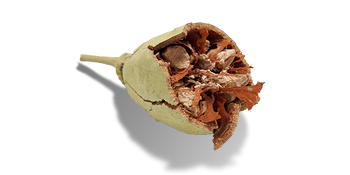The acute effect of a baobab fruit (Adansonia digitata) smoothie on cognitive function in healthy adults
Abstract:
The baobab fruit is high in both dietary fibre and polyphenols. Results from previous studies show that foods rich in low glycaemic dietary fibre(1) and those that are abundant in polyphenols(2), can improve cognitive function. The aim of the study was to measure the effect of baobab fruit extract on different measures of cognition in healthy adults. This study was a one-day single blind randomised crossover design (3 day washout) conducted on 20 participants (7 men, 13 women; aged 21–40 year; BMI 18–30 kg/m2). Participants were randomised to consume either a test smoothie consisting of 15g of baobab extract (1914μg/ml polyphenols) or a control smoothie without the addition of baobab (776μg/ml polyphenols), on different days in the morning after an overnight fast at Oxford Brooke University. Cognitive tests were administered 90 mins post consumption after a brief familiarisation of the tests. Cognitive measures were based on previous literature into polyphenols, and included executive function utilising the Stockings of Cambridge test(3) and spatial working memory (PsychoPy v1·82) designed by the researchers(4).

Results are means and standard deviations (SD) of all measures after the consumption of control and baobab smoothies in Percentages (%), Seconds (s) or Milliseconds (ms). Stockings of Cambridge (SOC); Response (Resp).* = p < 0·05 performed significantly better. PsychoPy and SOC test data were analysed using a Wilcoxon – Signed Rank test. Consumption of the baobab enriched smoothie significantly reduced movement duration (p < 0·05) but also increased unsuccessful move type in the Stockings of Cambridge test (p < 0·05). There were no significant differences between testing order. Compared with the taste and nutrient matched control, there were several trends in favour of the baobab smoothie (albeit not significant). Baobab consumption administered at 15 g in a smoothie significantly improved reaction time in executive planning tests, but also increased the amount of unsuccessful move types. This research has positive implications for the use of baobab consumption first thing in the morning for improving cognitive function in the hours post prandial.
References
1. Ingwerson et al. (2007) Appet 49, 240–244.
2. Lamport et al. (2012) Nutr Aging 1, 5–25.
3. File et al. (2005) Menopa 12, 193–201.
4. Field et al. (2011) Phys Behav 103, 255–60.
Copyright©2017 Proceedings of The Nutrition Society – https://doi.org/10.1017/S0029665117000167
Authors:
Shelly Coe
- Functional Food Centre, Oxford Brookes University, Gipsy Lane, Oxford OX3 OBP, UK
A. Bycroft
- Functional Food Centre, Oxford Brookes University, Gipsy Lane, Oxford OX3 OBP, UK









